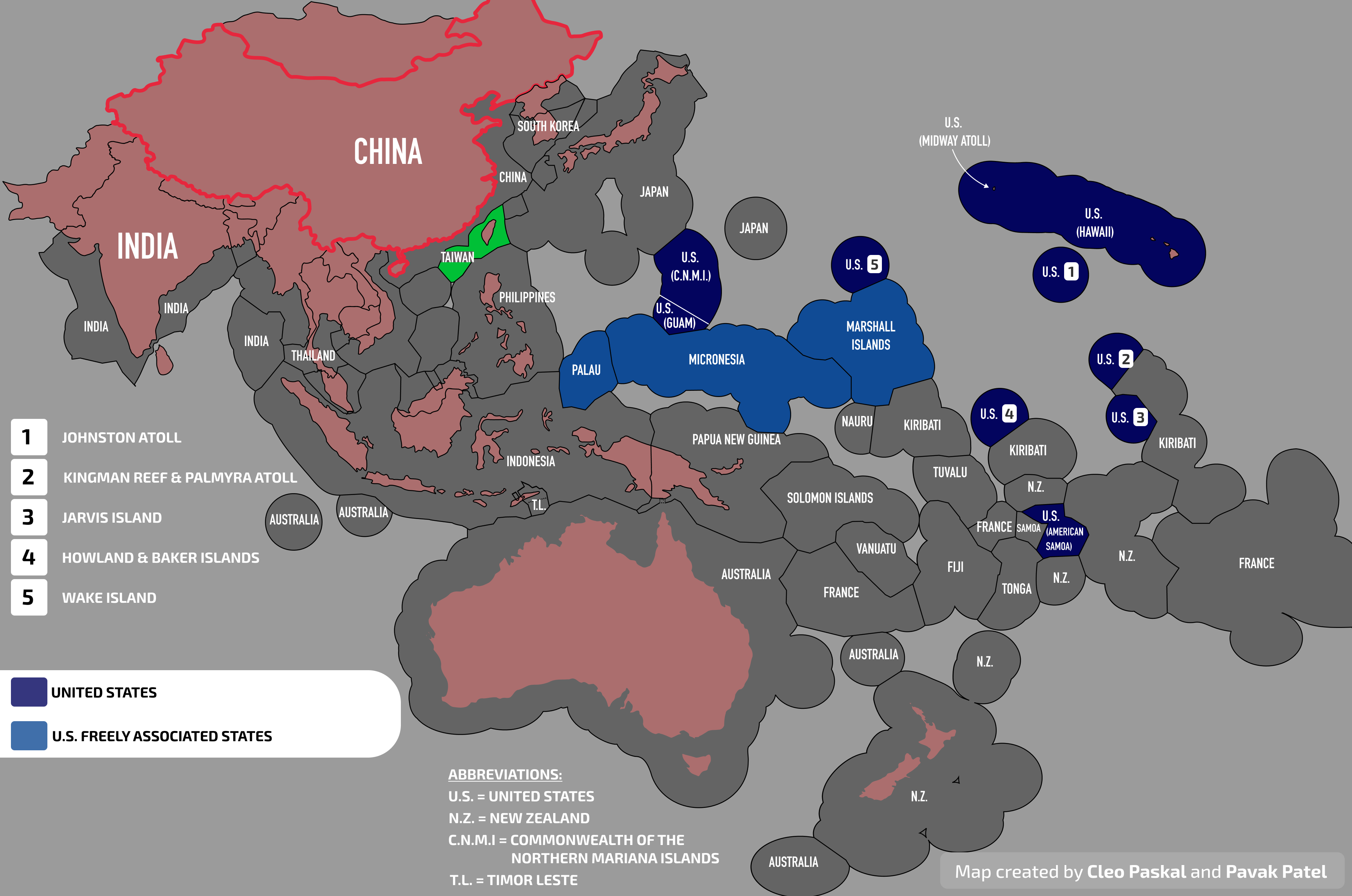Of the Pacific Island states, the three countries that are unquestionably the closest allies of the United States are the Republic of Palau, Federated States of Micronesia (FSM) and the Republic of the Marshall Islands (RMI).
The closeness of the relationship between the United States and each of the three is legally captured in the Compact of Free Association (COFA) each of them has with Washington.
The COFA agreements allow citizens from the Freely Associated States (FAS) to live and work in the U.S. or serve in the U.S. military. The COFAs also provide for some U.S. federal services in the FAS – to the point that not only are they served by the U.S. Postal Service, but they have U.S. zip codes, and mail to and from the U.S. is charged at domestic rates. They are, as then-U.S. President Ronald Reagan put it when the agreements were first being set up, “family.”
The COFAs also give the U.S. defense rights in the air, waters, and on the land of the FAS that are second only to what the U.S. has in the homeland (and likely more). The U.S. also gets the right of strategic denial, allowing it to block others – including foreign militaries – from the area that Washington deems a risk.
And the area involved is enormous, and strategically essential. The three countries are contiguous and cover a section of the Central Pacific the size of the United States. The uncontested operational environment granted to the U.S. by the COFAs allows the U.S. to deploy unimpeded from roughly Hawaii to the Philippines.
Think Guam, Saipan, the First and Second Island Chains, and bases in treaty partners like Japan and South Korea are important? Try resupplying them if the FAS are under hostile control.

What’s the Problem?
While the COFA agreements themselves continue indefinitely or until a party withdraws, the financial and services components are periodically renegotiated. We are currently in that phase.
The U.S. Congress has until September 30 to pass renewals that are designed to last for the next 20 years. The amounts being proposed are $6.5 billion to cover the three countries over 20 years, plus $600 million for the post office. That means around $110 million per country per year. As U.S. Senator Angus King put it, the entire amount is less than half of 1 percent of the annual defense budget.
But there are problems. All three FAS signed MoUs agreeing on the topline amount they would get, allowing an overall budget to go to Congress. Palau and FSM seem satisfied, and held formal signing ceremonies with U.S. officials in May.
However, Marshall Islands has since changed negotiators and is now asking for more than the $2.3 billion it agreed to in January. Specifically, the new team says they want more money to compensate for the damage and harm caused by the 67 nuclear tests the United States conducted in the late 1940s and 1950s.
The existing MoU it signed includes $700 million for a trust fund that Marshall Islands could chose to put toward that end, but reportedly State Department lawyers refused to allow it to be said by the U.S. side that the money was specifically compensation for the nuclear test.
The change in Marshall Islands’ position – and how it might dramatically affect not only the relationship with the United States but the lives of Marshallese – became clear over the last ten days.
Delegations from each of the FAS came to Washington for a Senate hearing on July 13 and a House of Representatives hearing on July 18. In the hearings, Palau’s president and FSM’s chief negotiator gave strong positive endorsements of the COFA renewal agreements that have now been submitted for introduction and approval by the U.S. Congress.
Marshall Islands’ delegation was represented in the Senate hearing by the new foreign minister and in the House hearing by the speaker of Parliament. Marshall Islands’ chief COFA negotiator led discussions.
All three RMI officials expressed their commitment to COFA renewal, but each openly called for additional funding for Marshall Islands tied to the damaging U.S. nuclear testing legacy, and for other purposes. The January MoU signed by the Marshalls was explicitly disowned in the Senate hearing.
This visibly disconcerted some members of Congress. In the hearings, Republicans and Democrats disagreed on a few procedural and housekeeping details, but were united in advising and even admonishing Marshall Islands not to engage in brinksmanship in the current volatile political climate in Congress.
The message is being conveyed outside the hearing rooms as well. Before and after the hearings, the three delegations made the rounds separately to meet with a reported two dozen Congressional leaders.
There was understanding and sympathy about the continuing harm caused by the legacy of nuclear testing, and acknowledgement of past unmet promises by the United States.
However, there was also concern that, given domestic politics in the U.S. and constraints resulting from internal House politics (offshoots from the bruising House speaker battle), attempting to rewrite the MoU with less than 20 legislative days left to get it passed could mean that Marshall Islands gets nothing.
That in turn would mean that, rather than have a massive increase in money coming into the country – including $700 million in new money for a trust fund that the RMI could decide to use for nuclear justice – Marshall Islands would need to take principle from its trust fund in order to just meet the costs of running its government.
Most if not all members of Congress the Marshall Islands delegates met have been consistently sympathetic with and supportive of the RMI’s unique needs and requirements due to the impacts of the U.S. nuclear testing program on the peoples and environment of the islands
Yet, in statements and questions during the congressional hearings and in meetings with U.S. senators and representatives, every member of Congress – without exception – strongly advised and urged Marshall Islands to end its brinkmanship over signing the Compact in their hopes of getting increased funding.
That included the Bipartisan House Indo-Pacific Task Force Chair Amata Radewagen (R – American Samoa) and Co-Chair Kilili Sablan (D – Commonwealth of Northern Mariana Islands), who both spoke in the hearing of growing up in the U.N. Trust Territory of the Pacific Islands and understanding the RMI’s quest for justice.
Radewagen even spoke about her father walking through the craters resulting from the nuclear testing at Bikini Atoll, and wondering if it contributed to his fatal cancer.
Still, each of these Pacific Islands leaders urged Marshall Islands in public and private, as one Congressional staff member said, to “take the money and run – and live to fight another day.”
Another congressional source who could not speak publicly stated, “The RMI was not going to get any new supporters by lobbying, but by going back for more after signing a deal that people regard as fair the RMI may have lost some supporters.”
Some of those who supported Marshall Islands most strongly in the past strongly supported the deal being offered. For example, in the hearing, Congresswoman Katie Porter (D – California), who has a strong record of support for the RMI on nuclear legacy issues, endorsed the U.S. offer negotiated by Biden Special Presidential Envoy Joseph Yun. Porter urged the RMI to get the $2.3 billion into the RMI COFA resiliency fund, and then continue educating Congress and the United States regarding ongoing U.S. responsibilities to the impacted communities.
One U.S. official familiar with the meetings stated, “Members of Congress who worked at RMI’s request to get a presidential negotiator appointed believe he did a good job, doubling the Trump offers, and getting Congressional approval guaranteed for 20 years appropriations for economic assistance, which repeatedly was referred to by members of Congress as ‘a really good deal for RMI in this budget environment.’”
At the same time, high-level leaders in Marshall Islands are deeply concerned about the direction of the negotiations, and the statements by their team. Kitlang Kabua, the RMI’s former negotiator, went so far as to publish an article in the Marshall Islands Journal stating: “I write this article to correct slanderous claims and misinformation against me that were raised by my colleagues in the Senate Committee hearing on Energy and Natural Resources… It is unfortunate that the blaring message from the statement made on behalf of our government, was not what the RMI expected to come out with from the negotiations… The Memorandum of Understanding that I had signed on behalf of President Kabua and the RMI Government was authorized and supported by Cabinet.”
What Now?
There are a range of possible reasons for the change in position on the part of Marshall Islands negotiators, including positioning for the upcoming November elections in the RMI.
However, if the current team is counting on logic and justice to get its way in Congress, there are a few hundred million Americans they may wish to speak with about how that tends to work out these days. The repeated questions about where the offsets for COFA funding would come from during the House hearing may have started to give them an inkling about how the House is operating these days.
On this issue, Congress is bipartisan, and supportive, but it’s still Congress. And even in better times, anything can happen. In 2010 there was Support from Congress for Palau’s funding but the Departments of the Interior and State bickered over who and how to transmit to Congress and it was sent too late to be approved in 2010. Then it got even more complicated, to the point that funding around helium got involved. It took until 2018 for that to be sorted out.
The extended insecurity affected the Palau-U.S. relationship. China saw the opening and rushed in to take advantage. That was the window in which China made huge political and economic gains in Palau (a country that recognizes Taiwan).
Under the best circumstances, getting the COFA renewals passed by September 30 will be a minor miracle. And these are not the best circumstances. The clock is ticking.

































